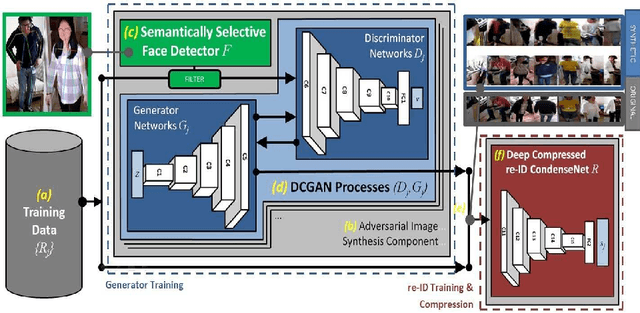Víctor Ponce-López
Large Language Models for Multi-Choice Question Classification of Medical Subjects
Mar 21, 2024Abstract:The aim of this paper is to evaluate whether large language models trained on multi-choice question data can be used to discriminate between medical subjects. This is an important and challenging task for automatic question answering. To achieve this goal, we train deep neural networks for multi-class classification of questions into the inferred medical subjects. Using our Multi-Question (MQ) Sequence-BERT method, we outperform the state-of-the-art results on the MedMCQA dataset with an accuracy of 0.68 and 0.60 on their development and test sets, respectively. In this sense, we show the capability of AI and LLMs in particular for multi-classification tasks in the Healthcare domain.
Semantically Selective Augmentation for Deep Compact Person Re-Identification
Jun 18, 2018



Abstract:We present a deep person re-identification approach that combines semantically selective, deep data augmentation with clustering-based network compression to generate high performance, light and fast inference networks. In particular, we propose to augment limited training data via sampling from a deep convolutional generative adversarial network (DCGAN), whose discriminator is constrained by a semantic classifier to explicitly control the domain specificity of the generation process. Thereby, we encode information in the classifier network which can be utilized to steer adversarial synthesis, and which fuels our CondenseNet ID-network training. We provide a quantitative and qualitative analysis of the approach and its variants on a number of datasets, obtaining results that outperform the state-of-the-art on the LIMA dataset for long-term monitoring in indoor living spaces.
Non-Verbal Communication Analysis in Victim-Offender Mediations
Jan 19, 2015



Abstract:In this paper we present a non-invasive ambient intelligence framework for the semi-automatic analysis of non-verbal communication applied to the restorative justice field. In particular, we propose the use of computer vision and social signal processing technologies in real scenarios of Victim-Offender Mediations, applying feature extraction techniques to multi-modal audio-RGB-depth data. We compute a set of behavioral indicators that define communicative cues from the fields of psychology and observational methodology. We test our methodology on data captured in real world Victim-Offender Mediation sessions in Catalonia in collaboration with the regional government. We define the ground truth based on expert opinions when annotating the observed social responses. Using different state-of-the-art binary classification approaches, our system achieves recognition accuracies of 86% when predicting satisfaction, and 79% when predicting both agreement and receptivity. Applying a regression strategy, we obtain a mean deviation for the predictions between 0.5 and 0.7 in the range [1-5] for the computed social signals.
 Add to Chrome
Add to Chrome Add to Firefox
Add to Firefox Add to Edge
Add to Edge